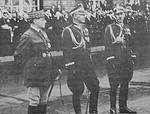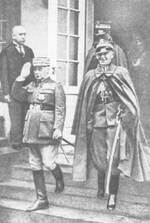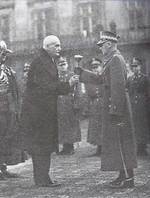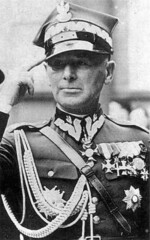Edward Rydz-Śmigły
| Surname | Rydz-Śmigły |
| Given Name | Edward |
| Born | 11 Mar 1886 |
| Died | 2 Dec 1941 |
| Country | Poland |
| Category | Military-Ground |
| Gender | Male |
Contributor: C. Peter Chen
ww2dbaseEdward Rydz (later Rydz-Śmigły) was born in the village of Łapszyn near Brzeżany, Tarnopol Voivodship, Galicia, to a non-commissioned officer in the Austro-Hungarian Army. He was orphaned at the age of thirteen. He went on to study philosophy and history of art at Jagiellonian University in Kraków, then studied art in Kraków, Vienna, and Munich. In 1910, he enrolled in the reserve officer's academy in Vienna, but declined a commission in the Austro-Hungarian Imperial Army. In 1912, he took part in the founding of the paramilitary Riflemen's Association (Związek Strzelecki) in Poland.
ww2dbaseIn Jul 1914, Rydz was drafted into the Austrian Army, then in the next month transferred to the Polish Legions. He fought against Russians in Southern Vistula valiantly, but his unit was disbanded and its men imprisoned in 1917 after the unit's refusal to swear allegiance to Austrian authorities. Rydz, however, was not imprisoned due to health reasons. He returned to Poland, adopted a nom de guerre Rydz-Śmigły, and led the Polish Military Organization. In Oct 1918, he joined the socialist government of Ignacy Daszyński in Lublin as the Minister of War. In the following month, the government submitted to Józef Piłsudski's government, and became a general in the Polish Army. In this role, he became a famed leader of the Polish-Bolshevik War, and was awarded the position of Inspector General of the Polish Army in the Vilna district and later Warsaw. In 1926, he participated in Piłsudski's successful coup d'etat. On 13 May 1935, after Piłsudski's death, Rydz became the Inspector General of the Polish Armed Forces. On 10 Nov 1936, he was named Marshal of Poland. At this time, he legally changed his name to his former nom de guerre Rydz-Śmigły. He served rather obediently under President Ignacy Mościcki, but the gap between the two men increased gradually.
ww2dbaseAt the eve of the Germany invasion of 1939, Rydz-Śmigły claimed that he had foreseen all the signs of invasion. Even if he did, however, he had too little time to prepare the defenses. As commander of all Polish forces, he fought the German forces the best he could, while he evacuated Warsaw of its civilians. To his disappointment, reinforcements from Britain and France never came. On 17 Sep 1939, Russian forces began their invasion from the east. Attacked from both sides, Rydz-Śmigły ordered a withdraw southward toward Romania, where he was interned. While interned in Romania, his leadership role was assumed by his political opponent Władysław Sikorski, but Rydz-Śmigły continued to organize Polish resistance against German occupation. On 10 Dec 1940, he escaped his imprisonment and fled into Hungary. Upon learning this news, Sikorski issued an order for Rydz-Śmigły's arrest and transport to Britain. Rydz-Śmigły, now known by his alias Adam Zawisza, returned to Poland in 30 Oct 1941 to take part in the Polish resistance as a common soldier. Before he made any significant contributions, however, he died of heart failure in Dec 1941.
ww2dbaseSource: Wikipedia.
Last Major Revision: Mar 2006
Photographs
 |  |  |  |
Edward Rydz-Śmigły Timeline
| 11 Mar 1886 | Edward Rydz-Śmigły was born. |
| 2 Dec 1941 | Edward Rydz-Śmigły passed away. |
Please consider supporting us on Patreon. Even $1 per month will go a long way! Thank you. Please help us spread the word: Stay updated with WW2DB: |
Visitor Submitted Comments
1 Sep 2010 12:31:59 AM
A caricture of Ridz Smigly on a wwii german pack of playing cards at:
http://a.trionfi.eu/WWPCM/decks02/d00997/d00997.htm
1941
"Rheinberger" (Bad Durkheim, Germany)
deck "Propaganda", 1941 designed by Manfred Schmidt
17 Jun 2011 06:00:24 AM
@Anonymous - there's a large group of dumb folks, who instantly describe every Pole as anti-Semite I am afraid that Anonymous, who suggested that Rydz Smigly was "openly anti-semitic or making anti-semitism part of the Polish national agenda in the 30s" know literary NOTHING about the history of Poland in 30’s. As in many of European countries there was a nationalistic party – called ONR (National Radical Camp), which was spreading some anti-semitic ideas while Rydz Smigly was one of the leaders of ONR political opponents, so called Obóz Sanacyjny (Sanacja). After military coup d’etat in 1926 Sanacja (http://en.wikipedia.org/wiki/Sanation) was cooperating with Jewish political parties in Polish parliament and at the same time several activists of ONR and national Democratic party were imprisoned. Suggesting that Rydz Smigly was anti-Semite says a lot about complete ignorance an lack of knowledge of someone who says so.
16 Apr 2017 04:18:15 PM
Something is very wrong with this article. He was not a good person according to a Catholic Non-Pole whose home was invaded. The person said the Poles were saying Hail Smigly! and he made the decision to remove the weapons from the Polish Army. They were fools to trust him. He aided the Germans to easily take Poland.
All visitor submitted comments are opinions of those making the submissions and do not reflect views of WW2DB.
» Invasion of Poland
- » 1,167 biographies
- » 337 events
- » 44,642 timeline entries
- » 1,244 ships
- » 350 aircraft models
- » 207 vehicle models
- » 376 weapon models
- » 123 historical documents
- » 261 facilities
- » 470 book reviews
- » 28,517 photos
- » 365 maps
Captain Henry P. Jim Crowe, Guadalcanal, 13 Jan 1943
Please consider supporting us on Patreon. Even $1 a month will go a long way. Thank you!
Or, please support us by purchasing some WW2DB merchandise at TeeSpring, Thank you!
13 Jul 2006 02:49:28 PM
Your article does not mention Smigly being openly anti-semitic or making anti-semitism part of the Polish national agenda in the 30s!